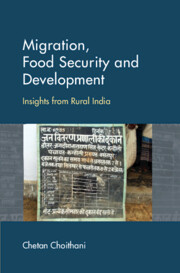Book contents
- Frontmatter
- Contents
- List of Figures, Tables and Boxes
- List of Photos
- Preface
- Acknowledgements
- List of Abbreviations
- 1 Introduction
- 2 Bridging the Disconnect between Migration and Food Security
- 3 Dynamics of Food Insecurity, Migration and Urbanisation in India
- 4 The Context of Migration
- 5 Connections between Food Safety Nets and Migration
- 6 Migration, Remittances, Land and Household Food Security
- 7 Opening the Household Box
- 8 Conclusion
- References
- Index
Preface
Published online by Cambridge University Press: 22 February 2023
- Frontmatter
- Contents
- List of Figures, Tables and Boxes
- List of Photos
- Preface
- Acknowledgements
- List of Abbreviations
- 1 Introduction
- 2 Bridging the Disconnect between Migration and Food Security
- 3 Dynamics of Food Insecurity, Migration and Urbanisation in India
- 4 The Context of Migration
- 5 Connections between Food Safety Nets and Migration
- 6 Migration, Remittances, Land and Household Food Security
- 7 Opening the Household Box
- 8 Conclusion
- References
- Index
Summary
I write this preface at a time when the world has experienced the horrors of the Covid-19 pandemic for almost two years now. The devastating impacts of this pandemic on economic and social systems have affected communities across the world. In many countries, one particular group has arguably shared the disproportionate burden of the pandemic: migrant workers. The fear of the spread of the virus, abrupt halting of economic activities and the resultant loss of employment, lockdowns and travels restrictions left them stranded without adequate support from host communities and governments.
In India, the broad geographic focus of this book, the Covid-19-induced lockdown caused a full-blown migrant-workers crisis. To contain the spread of the virus, on 24 March 2020, the Government of India announced, on a mere four-hour notice, a complete shutdown of the country for 21 days (which was subsequently extended a few times, with phased reopenings beginning in June). All transport operations were grounded, and non-essential services were shut overnight. This sudden countrywide lockdown saw millions of India's rural migrant workers stranded in cities without income, shelter and food. Employers abandoned them and landlords evicted them. The cities they had helped build and fuel had overnight turned their backs on them. The health crisis soon turned into a humanitarian crisis of an enormous scale. In a scene reminiscent of India's Partition, chaos and confusion sent millions of poor migrants on the country's highways, bus stands and train stations. Unsure of support from the state that did not consider their existence in the abrupt lockdown decision, migrants started to head home on foot, arduously walking hundreds of kilometres to their native places, without adequate food and water along the way. On their treacherous journeys, some were killed by police brutalities, others died of exhaustion and road accidents, and many lost their lives to starvation. In an incident that shook the nation, a freight train ran over and killed 16 exhausted migrants who had fallen asleep on the rail tracks on their walk back home.
The irony of the situation was that the lockdown which had the objective of saving lives, claimed lives. Media coverage and public sympathy on the plight of stranded migrants swung the government into action to provide them with relief. Civil society and citizen groups led relief efforts from the front. The concerns of hunger and starvation among migrants figured prominently in relief measures.
- Type
- Chapter
- Information
- Migration, Food Security and DevelopmentInsights from Rural India, pp. xvii - xxPublisher: Cambridge University PressPrint publication year: 2023



